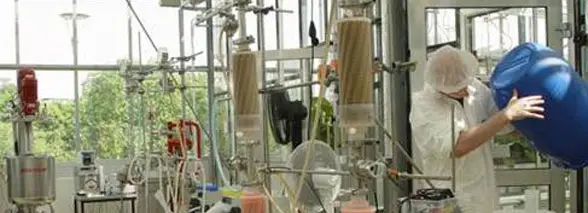Welcome to the Pharma-Planta Consortium website!
Pharma-Planta is an EU Sixth Framework Program integrated project whose aim is to develop an approved production pipeline for pharmaceutical proteins made in plants, and take a candidate product all the way through development culminating in a phase I human clinical trial.
Please click on the links to learn more about the project. There is also a presentation showing an overview of the project and its achievements here.
See our Latest News page to learn about the recent launch of Pharma-Planta's pivotal phase I clinical trial of a plant-derived microbicidal protein!
Pharma-Planta aimed to build a plant based production platform for pharmaceuticals in Europe and to enter the first candidate pharmaceuticals into human clinical trials, a feat that was achieved in June 2011. The programme has developed robust risk-assessment and risk-management practices based on health and environmental impact, and worked with EU regulatory authorities such as EMA and EFSA to deal with issues surrounding safety and acceptance.
Plants have enormous potential for the production of recombinant pharmaceutical proteins as they are inexpensive and versatile, amenable to rapid and economical scale-up. The use of GM for the production of pharmaceuticals has precedents, such as human insulin and hepatitis B vaccine, but plant derived materials used in humans have not been formally addressed within the EU. Our major goal was to address the necessary biosafety and regulatory requirements for the use of plant derived pharmaceuticals through a process of engagement and consultation with regulatory bodies involved in GM plants as well as new medicines. The project addresses pharmaceuticals for the prevention of HIV, rabies, tuberculosis and diabetes, that remain significant health problems both in Europe and the developing world.
Pharma-Planta consortium partners represent many of the major laboratories in Europe focusing on the creation of transgenic plants that express important pharmaceuticals for human health. Collectively, the consortium has a wide range of expertise spanning the areas of molecular biology, plant biology, immunology, recombinant protein expression technology, vaccinology, plant biotechnology, risk assessment and IP management. This project provides a unique opportunity to make an impact on EU and global health through the responsible development of plant biotechnology.
Mission
The mission of the Pharma-Planta Consortium is to develop efficient and safe strategies for the production of clinical-grade protein pharmaceuticals in plants, and to define the procedures needed for the production of these proteins in compliance with the strict regulatory standards that govern the manufacture of all pharmaceuticals. Ultimately we seek to take a candidate product all the way through the development pipeline culminating in a phase I human clinical trial.
Objectives
The original objectives of the Pharma-Planta project were:
1. To produce a recombinant pharmaceutical molecule in transgenic plants, which will be developed through all regulatory requirements, GMP standards and pre-clinical toxicity testing. This will then be evaluated in Phase I human clinical trials.
2. To develop robust risk assessment practices for recombinant pharmaceutical molecules produced in plants, based on health and environmental impact, working with regulatory authorities within the EU as well as public groups to ensure that the production systems are as safe and as acceptable as possible, and that they comply with all biosafety regulations.
3. To define and carry out a coordinated program for securing and managing intellectual property that will facilitate the availability of high priority plant-derived recombinant pharmaceuticals to the poor in developing countries while simultaneously allowing the products to be developed commercially in Europe and North America.
4. To develop and refine new strategies for the expression of recombinant pharmaceuticals in plants, which can be used on a generic basis for molecules that are normally expressed poorly.
5. To develop and generate transgenic plants expressing a second generation of recombinant molecules that will be used in future clinical trials.